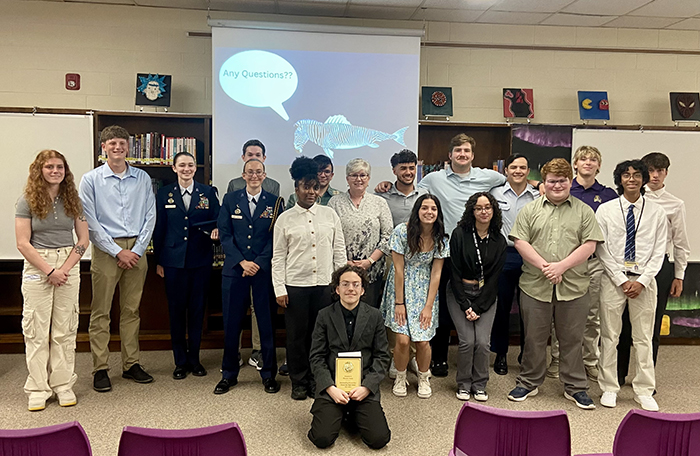Menchville Honors Research students present spring projects
Posted: May 3, 2024
Students in Menchville High School's Honors Research and Applications in Cellular Processes class presented their spring research projects on May 2 in the school's Media Center.
In small groups, they conducted studies and wrote papers as part of their 13-week projects. Students used zebrafish embryos to simulate fetal alcohol syndrome, the effects of steroids early in development, the impact of nicotine and red dye on early development, and the effect of antihistamines on drug-induced Parkinsonian symptoms.
Science teacher Ashley Chassard, who teaches the class, presented the new award of Outstanding Researcher to graduating senior Phoenix Smith.
"Having you in a class and working with you, you're one of those people who makes everybody better," Chassard said. "I want to thank you for that."
Presenting on the effects of ethanol on zebrafish development were Riley Barad, Bruce Hitt, Michael Jones, Kiera Smith and Marangelys Lopez Torres. Myna Chassard, Kassey Daugherty, Thomas Harrington and Nolan Stuffel presented on the effect of Ibutarmoren mesylate exposure during embryonic zebrafish development on larva heart rate.
Presenting on the neurotoxic effects of nicotine and Red-3 on zebrafish development were Aldion Bytyqi, Brandon Dionzgon, Jack Gorton and Aric Ruks. The project on the effects of first, second and third generation H1 antihistamines on Parkinson's Disease was presented by Oscar Davila, Zipporah Grantham, Elizabeth McElfresh, Smith and Jarett Stephens.
Students detailed the materials, methods and outcomes for each project, as well as explaining the data they collected.
"I'm really proud of them and I want to thank them," Chassard said.
The Honors Molecular Cell Biology and Honors Research and Applications in Cellular Processes courses at Menchville provide students with a year-long intensive lab-based learning experience that will develop biological lab skills and techniques to foster the critical thinking, collaboration and communication skills necessary for students to become college, career and citizen-ready, according to Chassard.
The experience is designed to help students discover their interests and possible careers in the area of STEM-science, technology, engineering and math-while honing capabilities to help them be successful in higher education.
"Students work the first semester to learn various lab skills and techniques along with the inquiry nature of the scientific process, which will prepare them for the student-led and designed project-based learning that encompasses the second semester," Chassard said.
The courses are created to allow students to learn from their mistakes and embrace inquiry. Students are free to be curious and design investigations that allow them to seek answers to their questions, according to Chassard.
"The goal is to cultivate students who are critical thinkers and problem solvers," Chassard said.








